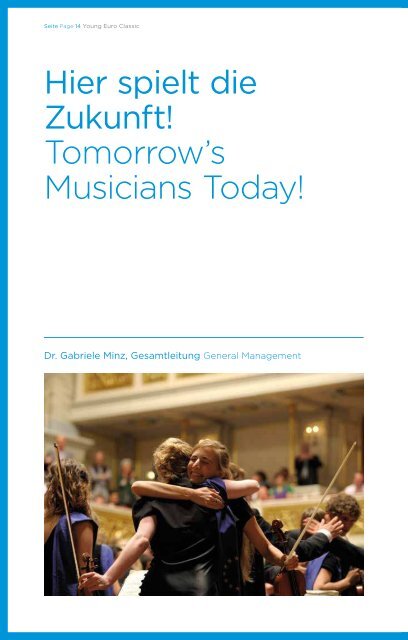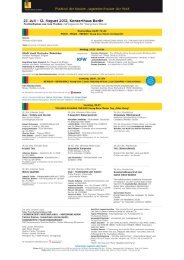here - Young Euro Classic
here - Young Euro Classic
here - Young Euro Classic
Erfolgreiche ePaper selbst erstellen
Machen Sie aus Ihren PDF Publikationen ein blätterbares Flipbook mit unserer einzigartigen Google optimierten e-Paper Software.
Seite Page 14 <strong>Young</strong> <strong>Euro</strong> <strong>Classic</strong><br />
Hier spielt die<br />
Zukunft!<br />
Tomorrow’s<br />
Musicians Today!<br />
Dr. Gabriele Minz, Gesamtleitung General Management<br />
<strong>Young</strong> <strong>Euro</strong> <strong>Classic</strong> ist einzigartig, für symphonische<br />
Jugendorchester das bedeutendste Festival<br />
der Welt. Zugleich ein absoluter Publikumsrenner:<br />
Fast jeden Abend, 17 Tage lang, ist das Konzerthaus<br />
am Gendarmenmarkt brechend voll – nicht<br />
nur bei Beethoven und Schostakowitsch, sondern<br />
auch bei zeitgenössischer oder völlig ungewohnter<br />
Musik aus Asien oder Afrika. Denn genau die<br />
mitzubringen, fordern wir die jungen Orchester<br />
auf. Und das Erstaunlichste: Die Zuschauer sind<br />
begeistert! Die jungen Künstler oft fassungslos.<br />
Eine solche Euphorie – auch für Unbekanntes – in<br />
einem solchen Ambiente haben sie noch nie erlebt.<br />
Die rein europäische Dimension des Festivals hat<br />
sich nur das Eröffnungsjahr lang gehalten … es<br />
wundert einige, aber das „<strong>Euro</strong>“ im Namen dagegen<br />
ist erhalten geblieben. Denn mittlerweile ist die<br />
europäische Orchesterkultur weltweit vertreten<br />
und immer mehr Orchester, die sich bewerben, sind<br />
in immer ferneren Ländern beheimatet. Bei <strong>Young</strong><br />
<strong>Euro</strong> <strong>Classic</strong> aufzutreten ist für die Orchester eine<br />
echte Auszeichnung.<br />
Veranstaltet wird das Festival von einem gemein-<br />
nützigen Freundeskreis, dem Deutschen Freun-<br />
deskreis europäischer Jugendorchester, der der<br />
Idee finanziell und organisatorisch auf die Beine<br />
geholfen und starke Flügel verliehen hat. Dabei<br />
hatten Kulturkenner der Idee zum Ende des letzten<br />
Jahrhunderts keine Chance gegeben: In Berlin,<br />
hieß es, wolle im August keiner Kultur, sondern<br />
bloß einen Biergarten. Aber das ist Geschichte...<br />
Seit dem August 2000 gibt es in Berlin kein kulturelles<br />
Sommerloch mehr. Seit zwölf Jahren ist die<br />
deutsche Hauptstadt das Mekka für professionelle<br />
junge Orchester aus <strong>Euro</strong>pa und der ganzen Welt.<br />
Hier spiegelt sich die rasante Entwicklung, die die<br />
weltweite Jugendorchesterbewegung im letzten<br />
Jahrzehnt genommen hat, hier bekommt sie Impulse<br />
– im symphonischen wie im kammermusikalischen<br />
Bereich, mit nationalen Besonderheiten und<br />
als soziale Bewegung.<br />
Die Fäden dieser weltweiten Erfolgsgeschichte<br />
europäischer Orchesterkultur mit anderen<br />
Musiktraditionen und –nationen zu verflechten,<br />
ist mittlerweile fester Bestandteil von <strong>Young</strong> <strong>Euro</strong><br />
<strong>Classic</strong>. Inzwischen sind bi-nationale und multinationale<br />
<strong>Young</strong> <strong>Euro</strong> <strong>Classic</strong> Festivalorchester<br />
in China, Indien, Südosteuropa, Russland, Japan<br />
und der Türkei aufgetreten: vor Kanzlerin und<br />
Präsidenten, vor Spitzen der Politik und Wirtschaft –<br />
und immer vor einem begeisterten Publikum.<br />
Getreu unserem Motto: <strong>Young</strong> <strong>Euro</strong> <strong>Classic</strong> - Hier<br />
spielt die Zukunft! Eine Zukunft, in die wir gerne<br />
mit Ihnen gemeinsam gehen wollen.<br />
<strong>Young</strong> <strong>Euro</strong> <strong>Classic</strong> Seite Page 15<br />
<strong>Young</strong> <strong>Euro</strong> <strong>Classic</strong> is unique: the world’s premiere<br />
festival for symphonic youth orchestras. Nearly<br />
every evening throughout the festival’s 17 days the<br />
Konzerthaus at the Gendarmenmarkt square is full<br />
to bursting. And it’s not just Beethoven and Shostakovich<br />
that draw sell-out audiences, but contemporary<br />
compositions too. Or even sometimes very<br />
unfamiliar sounds from Asia or Africa. But that’s<br />
precisely what we tell our young orchestras that we<br />
want to hear. And our audiences love it! The young<br />
musicians can often hardly believe their eyes and<br />
ears. Such a rapturous reception, in such a setting,<br />
for such new and challenging music – it’s a whole<br />
new experience for them. The purely <strong>Euro</strong>pean<br />
dimension of the festival was only really a feature<br />
of the very first year, which explains why t<strong>here</strong> are<br />
those who ask us why we’ve retained the ‘<strong>Euro</strong>’<br />
in the festival title. Well, because the <strong>Euro</strong>pean<br />
orchestral tradition is a global phenomenon even<br />
if more and more of the orchestras at our festival<br />
come from countries that are further and further<br />
away from <strong>Euro</strong>pe. But they all highlight what an<br />
honour it is to participate in <strong>Young</strong> <strong>Euro</strong> <strong>Classic</strong>.<br />
The festival is organised by a non-profit organisation,<br />
the German Circle of Friends of <strong>Euro</strong>pean Youth<br />
Orchestras, which helped to make the fledgling<br />
festival a financial and organisational success and<br />
enabled it to really take off. In those early days,<br />
many sceptics argued that the idea of trying to<br />
tempt people out of the beer gardens and into the<br />
concert hall in the high summer month of August<br />
would never take off. But those fears were unfounded<br />
and since August 2000 t<strong>here</strong>’s none of the<br />
old talk of Berlin’s cultural life going into summer<br />
recess. For twelve years the German capital has<br />
been a Mecca for young orchestras from <strong>Euro</strong>pe<br />
and the rest of the world! Our festival reflects the<br />
huge global boom in interest in youth orchestras<br />
during the last decade and it offers the perfect<br />
backdrop for symphonic and chamber ensembles,<br />
for the expression of the broadest-possible range of<br />
national musical traditions, and for youth music as a<br />
social movement.<br />
Interweaving <strong>Euro</strong>pean orchestral culture with mu-<br />
sic traditions from other nations: that’s one of the<br />
cornerstones of <strong>Young</strong> <strong>Euro</strong> <strong>Classic</strong>. In recent years,<br />
bi-national and multi-national <strong>Young</strong> <strong>Euro</strong> <strong>Classic</strong><br />
Festival Orchestras have performed in China, India,<br />
Southeastern <strong>Euro</strong>pe, Russia, Japan and Turkey –<br />
playing in front of the German chancellor, for presidents,<br />
and for other leading figures from the worlds<br />
of politics and business. And t<strong>here</strong>’s one thing that<br />
all their audiences share – their enthusiasm. Our<br />
motto is Tomorrow’s Musicians Today! A tomorrow<br />
that we look forward to sharing with you.



